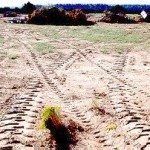Over seven months after their arrest at Camp Anna Mae on the HPL, charges of trespass were dismissed against Joella Ashkie, Ruth Benally, Louise Benally, Elvira Horseherder and Pauline Whitesinger.
The five Navajo women were arrested on July 11, 2001 and charged with trespass in range unit 262 of the Hopi Reservation. Repeated motions to continue and to dismiss the case had delayed its hearing until February 27, 2002.
Following two days of testimony from witnesses for the Hopi Tribe, defense attorney Joe Washington asked for a dismissal on the grounds that the Hopi Tribal Prosecutor had not proved its case. In order to prove criminal trespass under Hopi Ordinance 21, the Tribe had to prove that the women entered an enclosed, fenced or cultivated area without authorization. According to Washington, the Tribe had failed to prove that Camp Anna Mae met any of these criteria.
Chief Judge Gary LaRance granted the motion and the five Navajo defendants were acquitted.
“We are most disappointed with the outcome of the case,” said Cedric Kuwaninvaya, Chairman of the Hopi Land Team. “The Hopi Tribe maintains that the defendants were unauthorized to be at Camp Anna Mae, which is a closed area of the Hopi Reservation, and they did not seek the required permission from the Tribe to hold any gatherings on Hopi land. These two acts are a clear violation of Hopi tribal law.”
“The case was dismissed based on a failure to establish legal technicality and in no way does the ruling vindicate the Navajo women’s presence at Camp Anna Mae, which is a closed area of the Hopi Reservation,” said Hopi Chairman Wayne Taylor, Jr.
“Additionally,” Taylor added, “the case was not dismissed on the grounds of religious freedom. Chief Judge LaRance declined to hear any testimony regarding allegations of the Hopi Tribe violating the defendants’ religious rights. Dismissal of this case in no way sanctions the holding of any future gathering on Hopi land without the expressed consent of the Hopi Tribe, regardless of the purpose of the gathering.”
Notwithstanding the Tribe’s disappointment in the outcome of the case, the ruling does demonstrate that everyone subject to the jurisdiction of the Hopi Tribal Courts, both Hopi and non-Hopi, can receive a fair and unbiased trial in the Hopi court system.





